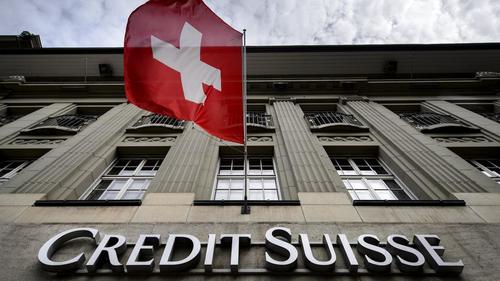“And the future is certain, give us time to work it out…”
Markets were shaken but unstirred by the collapse of Greensill and the Archegos unwind trades. Credit Suisse is the ultimate loser of the two scandals – reputationally damaged and holed below the water line. The bank is paying the price of years of flawed management, poor risk awareness. and its self-belief it was still a Tier 1 global player. Its’ challenge is to avoid becoming the Deutsche Bank of Switzerland – which it will struggle to do without a radical and unlikely shakeout.
As the global economy bounces back, markets are having a good time as indices close higher, but things aren’t so bright in Switzerland.
I started this morning by opening Credit Suisse’s Private Banking website. I was curious. After blagging my way onto the site by stating I am an exceptionally wealthy Mexican exporter with oodles of easily transportable assets and free cash to invest, I read through the offering. As is traditional on any private banking website, it featured a video of a yacht. To be honest… and I know about yachts – I’ve seen better. But if I was looking for a “trusted partner” at “every life stage” and wanted to avail myself of the their collective experience after 164 years in business, numerous best banks awards and “Swiss-class customer service”… where else would I go?
Along the road to UBS? Or to someone infinitely better?
If you are wealthy enough to be looking for a proper Swiss private bank, you probably would not be missing the current headlines. Reputation is everything – especially for Credit Suisse which was busily leveraging its “golf-plated reputation” and “pivoting” its High Net Worth and Ultra-HNW businesses to Asia in the expectation it would attract new Asian money. Err… probably not so easy now.
CS has dropped the shop twice this year: the Chf 4.4 bln loss on the Archegos fiasco and soon to be defined losses on Greensill. The head of the investment bank, Brian Chin and chief risk and compliance officer Lara Warner have walked the plank along with dozens of minor players. There were rumours circulating weeks ago Warner’s position was untenable in the wake of the Greensill farce. Now the rumours say CS’ risk management systems were overwhelmed.
But, let’s not overegg it. CS is not bust – just badly holed. Despite the losses and eating into provisions, it still uncomfortably passes its capital adequacy tests. It was able to post a relatively modest Chf900mm Q1 loss y’day. With the exception of the double blow, its business was looking ok. Problem is – arch-rival UBS will no doubt blow the covers off when it announces its numbers tomorrow.
Sadly, it looks like my recent jest about CS becoming the Deutsche Bank of Switzerland – destined from years of underperformance, losses and disaffection – is coming true. The question is not whether banks like Credit Suisse will survive, but why should they? The last years have not been good.
When I was a young banker, Credit Suisse First Boston and its militant, quasi-religious derivatives arm, Credit Suisse Financial Products, were among the most feared firms on the street. Their defining speciality was arrogance: you were unlikely to be good enough to be their client, and the rest of the street didn’t dare ask them for favours. It survived the global financial crisis that began in 2007 battered but relatively intact and was able to rebuild its capital levels on the back of its position as market leader. It walked while the US banks ran to grab market share.
I never understood why everyone thought the appointment of Tidjane Thiam as CEO was such a pivotal moment pointing to a splendid future for the bank. He proved another damp squib – setting it on its current road to nowhere as “a leading private bank and wealth manager with strong investment banking capabilities”. Take a look at the stock price for a view on how well that worked – down 45% since 2009. TJ’s reign ended in farce as he set spies to follow rivals who dared to defect from the bank. Read the story of his spats with neighbours – they will set you a wondering.
Next month Antonio Horta-Osoria, the much-lauded Portuguese banker who “saved” Lloyds, takes over as new CS chairman – everyone expects he will successfully reinvigorate the bank, overhaul its creaking systems, and put it back on a route to profit and relevance. Really? Lloyds (and previously Santander/Abbey) is nothing like CS, and to be frank, the sleep deprived banker did not exactly leave Lloyds looking a bright shinny success story as the stock has flatlined for 12 years.
What the Archegos losses show is CS not only got scammed in their role as prime broker to the dodgy family office – failing to dig behind the veil of multiple total return swap positions the firm held with multiple broker counterparties. They were also slow off the block when the other prime brokers caught in Archegos’ web blinked and started selling. Goldman, Morgan Stanley and Deutsche Bank apparently got out scot-free!
Everyone is now twittering about transparency, oversight, and investigating the apparent fraud. But what really caused one of the largest, most successful and prestigious banks on the planet to stumble twice, or what now appear to have been obviously flawed lending decisions?
It’s all about managing risk and risk-taking culture.
Do you take risk based on gut feel or on what a spread sheet tells you? Do you invest based on documentation and reports, or on the bigger picture of where a deal might go? Do you trust the traders or the risk management officers? Is the market about what spread sheets tell you, or – as I’ve so often written – is it just a vast voting machine that repeatedly trumps common sense? Risk is not a formula – it’s cryptography, experience and the art of finance combined. If you can’t see the wood for the trees – then risk management will fail.
Compare and contrast how Credit Suisse and Goldman Sachs fared in this farce. “Family office” Archegos was designed and structured specifically to arbitrage the system – largely unregulated, and able to do whatever it wanted. Despite founder Bill Hwang’s chequered past and previous history, the banks were keen to deal with him and seek profits. Goldman Sachs’ risk managers took note of Hwang’s convictions and apparently turned him down a couple of times before the account was finally opened, at which point the Squid went in aggressively to win his business. Eyes wide open.
Credit Suisse seems to have made the same mistake twice: being unable to process and manage the expectations of bankers wanting to do the business in either high yielding supply-chain finance with Greensill, or the complex derivative trades with Archegos, against the risks of what the counterpart was. In short – they didn’t know the client. Eyes wide shut to the dangers.
I’m damn sure Goldman understood perfectly what it was dealing with – and made its decisions accordingly.
The question is where does CS go from here? Trying to be a top private wealth manager and leading investment bank hasn’t worked. Its not top notch in either. In the CSFB days, it played with the big boys of Wall Street. Now it’s an also ran. Rather like Deutsche Bank, CS has lost its relevance. Based on the stories we’re hearing in the wake of dismissals and zero bonuses, the esprit de corp among the staff is evaporating.
How do you relaunch a botched brand? Watch that space… I don’t envy them.
Full story here Are you the author? Previous post See more for Next postTags: Featured,newsletter
































